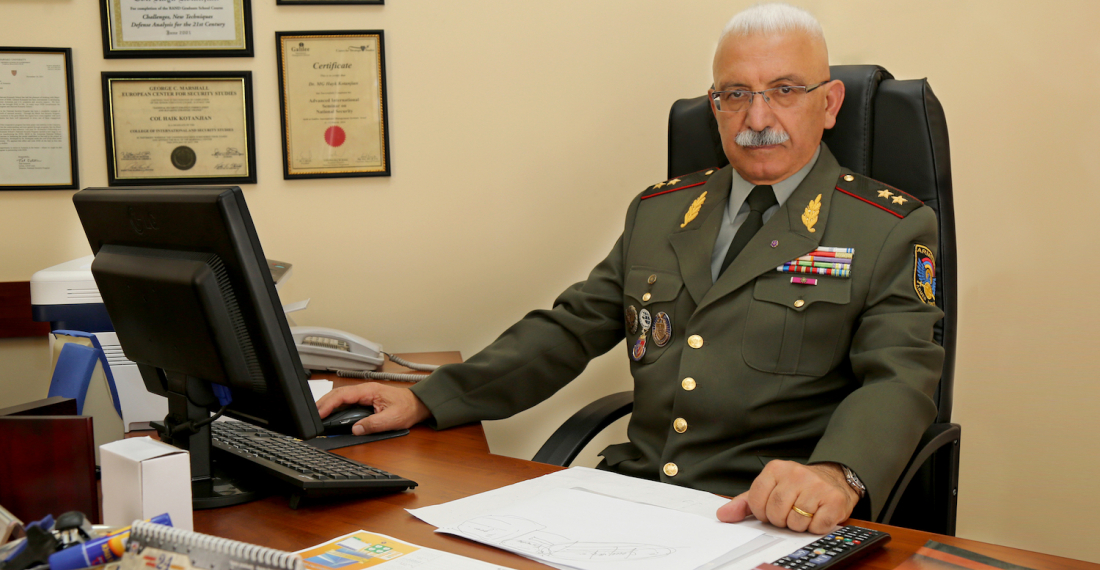The establishment of the 3+3 format would imperil the OSCE Minsk Group Co-Chairs format – one of the few remaining consensus-based platforms – at a time of global turmoil, argues Lieutenant-General, Dr Hayk Kotanjian in this interview with the Executive Director of the Political Science Association of Armenia, Dr Benyamin Poghosyan, for KarabakhSpace.eu.
Benyamin Poghosyan: Dear Professor Kotanjian, how do you assess the current situation in the Nagorno-Karabakh conflict zone in the context of the recent visit of the Iranian minister of foreign affairs to Russia?
Hayk Kotanjian: Through open-source intelligence monitoring of the regional security dynamics in the South Caucasus – a region located at the volatile crossroad of war and peace between the West and the East – I have to agree with the assessment of the Russian foreign minister, Sergey Lavrov, on the crucial role of Russia in stopping the war in Karabakh articulated during the joint press conference with the Iranian minister of foreign affairs, Hossein Amir-Abdollahian, in Moscow on 6 October 2021.
The essence of that assessment was presented in Minister Lavrov’s answer to the question on the Karabakh conflict settlement process: “Russia played a decisive role in stopping the war one year ago and having a trilateral declaration signed at the level of the president of Azerbaijan, president of Russia and prime minister of Armenia, under which a Russian peacekeeping contingent was deployed in the conflict zone in Nagorno-Karabakh to ensure peace and create a proper environment for a return to a peaceful life. In this context, we discussed today the initiative to create a “3+3” format to include the three South Caucasus countries and the three “big” neighbours, namely, Russia, Iran, and Turkey.” (See here on the official web page of the Russian Ministry of Foreign Affairs)
An exchange of opinions with colleagues in the international academic expert community dealing with the issues of conflict and consensus among world actors brings us to the following conclusion. Through the establishment of the 3+3 format, the Minsk Group Co-chairmanship platform – comprised of Russia, the US, and France – may be excluded from the Karabakh conflict settlement process. My colleagues point out that under the current conditions of global turbulence between the West and the East, the establishment of the 3+3 format may result in the loss of one of the few remaining consensus platforms between Russia, the US, and France around the principles of world order. There is a real danger of nullifying the consensus-based co-operation of three permanent members of the UN Security Council aimed at promoting strategic stability in this highly ambiguous environment of global transformation.
Instead of the US and France, the initiators of aggression against the Nagorno-Karabakh Republic and Republic of Armenia – Turkey and Azerbaijan – may be involved in the process. Moreover, this may happen even though the Russian foreign intelligence service identified Azerbaijan and Turkey as organising the involvement of radical Islamist terrorist organisations, which are banned in Russia, in the Karabakh war.
Benyamin Poghosyan – What can the Minsk Group Co-chairs and Russia, in particular, do in the current situation to preserve peace and stability in the region?
Hayk Kotanjian – While the international community seeks ways to address the security challenges of the transformation of the world order, it would be logical for Russia, as a leader in the Karabakh peacebuilding efforts and a permanent member of the UN Security Council, to initiate the process of identifying Azerbaijan and Turkey as the aggressors, which violated the principle of the non-use of force in the process of settlement of Karabakh conflict, which was agreed by the conflict sides under the auspices of Minsk Group co-chairs. Based on the Russian initiative, the two other Co-Chairs of the Minsk Group would signal to the international community that the initiators of the 2020 war in Nagorno Karabakh should not be rewarded by inclusion in the 3+3 format.
I want to emphasise once more the indispensable role of the three world leaders as the co-chairs of the OSCE Minsk Group – Russia, the US, and France – in reinforcing the primacy of international humanitarian law, securing the immediate release of all POWs based on the principle of all for all, and securing the historical, cultural and spiritual heritage of the Armenian people in Nagorno-Karabakh.



